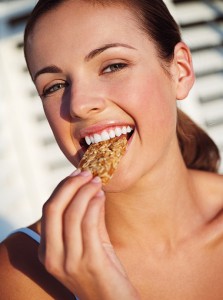A wide smile on your face does not only make you look better. According to research, it can make you mentally healthier, too.
 Smiling greatly improves your mood and is also capable of reducing your stress levels. While few people would argue that too much grinning is bad for you, research shows that flashing your teeth is beneficial to your well-being.
Smiling greatly improves your mood and is also capable of reducing your stress levels. While few people would argue that too much grinning is bad for you, research shows that flashing your teeth is beneficial to your well-being.
A study from Penn State University in the U.S. reported that people who smile more appear courteous, likeable and competent. This alone should be a good enough reason for you to smile more, especially while at work.
How a Smile Changes your Brain
When you smile, your brain keeps track of your current activity. Smiling more often breaks the brain’s tendency to stray towards negative thinking. If you grin often, you re-wire your brain to create positive patterns, overwriting the negative thoughts.
Shawn Achor, author of The Positive Tetris Effect, says it’s important to retrain the brain ‘to scan for the good things in life—to help us see more possibility, to feel more energy, and to succeed at higher levels’. When you smile a lot, you trigger a positive thinking pattern, which ultimately creates a happiness loop. The more you do it, the more your brain will shift towards more positive thoughts.
Smiling often is effective in altering bad thoughts, especially when you are in a situation that causes alarm.
Smiling Can Save Your Life
A smile does not only benefit your brain—it can also save your life, according to biochemist Sondra Barrett.
She says once you let go of unnecessary tension—which you can easily achieve through smiling—you free your cells from the rigidity. According to Barrett’s study, this can save your life. She adds that there have been cases where cancer patients go into remission after releasing their stresses.
‘Our cells are more than just fortuitous arrangements of chemicals’, she says. ‘They are a community of trillions of sentient entities cooperating to create a sanctuary for the human soul.’
Scientifically speaking, smiling leads to a better life quality. With a great smile comes a great mental outlook. David Madruga will give you more reasons to smile by helping you achieve that perfect set of pearly whites. Give our practice a call now.




 At his implant practice in Marylebone, Dr David Madruga has successfully treated many patients with implants. Whether you have some missing teeth, just one or even all your teeth missing, Dr Madruga has an implant solution for you.
At his implant practice in Marylebone, Dr David Madruga has successfully treated many patients with implants. Whether you have some missing teeth, just one or even all your teeth missing, Dr Madruga has an implant solution for you. Dental implants are small titanium screws that are placed in the jaw bone with a minor surgical procedure. They are bionic tooth roots that integrate with the bone, preventing the common problem of bone loss and providing a stable base for your replacement teeth – be that crowns, bridges or dentures. They are the only permanent way to replace your missing teeth.
Dental implants are small titanium screws that are placed in the jaw bone with a minor surgical procedure. They are bionic tooth roots that integrate with the bone, preventing the common problem of bone loss and providing a stable base for your replacement teeth – be that crowns, bridges or dentures. They are the only permanent way to replace your missing teeth. Believe it or not, you probably have a
Believe it or not, you probably have a  Each year, specialists throughout the UK perform about 10,000 implant procedures on the lower gum, particularly in patients over 65.
Each year, specialists throughout the UK perform about 10,000 implant procedures on the lower gum, particularly in patients over 65. In the dental parlance, malocclusion is the term for the improper alignment of teeth and jaws. While some people can shrug this off, this dental problem brings with it some serious effects on the body if left untreated.
In the dental parlance, malocclusion is the term for the improper alignment of teeth and jaws. While some people can shrug this off, this dental problem brings with it some serious effects on the body if left untreated. At our practice we offer two options for initial consultation: you can come here to the clinic, or can start with an e-consultation. Please visit our Your Consultation page for full details.
At our practice we offer two options for initial consultation: you can come here to the clinic, or can start with an e-consultation. Please visit our Your Consultation page for full details. This is why you should not take them for granted. Gum disease, cavities and other repercussions of neglecting oral health can lead to tooth loss, which can compromise your speech and eating habits. When a tooth is lost, the bone that surrounds it can also deteriorate, affecting your bite and appearance.
This is why you should not take them for granted. Gum disease, cavities and other repercussions of neglecting oral health can lead to tooth loss, which can compromise your speech and eating habits. When a tooth is lost, the bone that surrounds it can also deteriorate, affecting your bite and appearance. In addition, because dental implants replace the root of the tooth in addition to the tooth itself, they are considered the most long-lasting solution for missing teeth.
In addition, because dental implants replace the root of the tooth in addition to the tooth itself, they are considered the most long-lasting solution for missing teeth. When people have an incomplete set of teeth, they will have a hard time brushing or flossing between the gaps. This increases the likelihood of bacterial growth and infection among the remaining teeth. Poor oral health maintenance due to the gaps may cause dental caries, gum disease and other oral problems as a result.
When people have an incomplete set of teeth, they will have a hard time brushing or flossing between the gaps. This increases the likelihood of bacterial growth and infection among the remaining teeth. Poor oral health maintenance due to the gaps may cause dental caries, gum disease and other oral problems as a result.